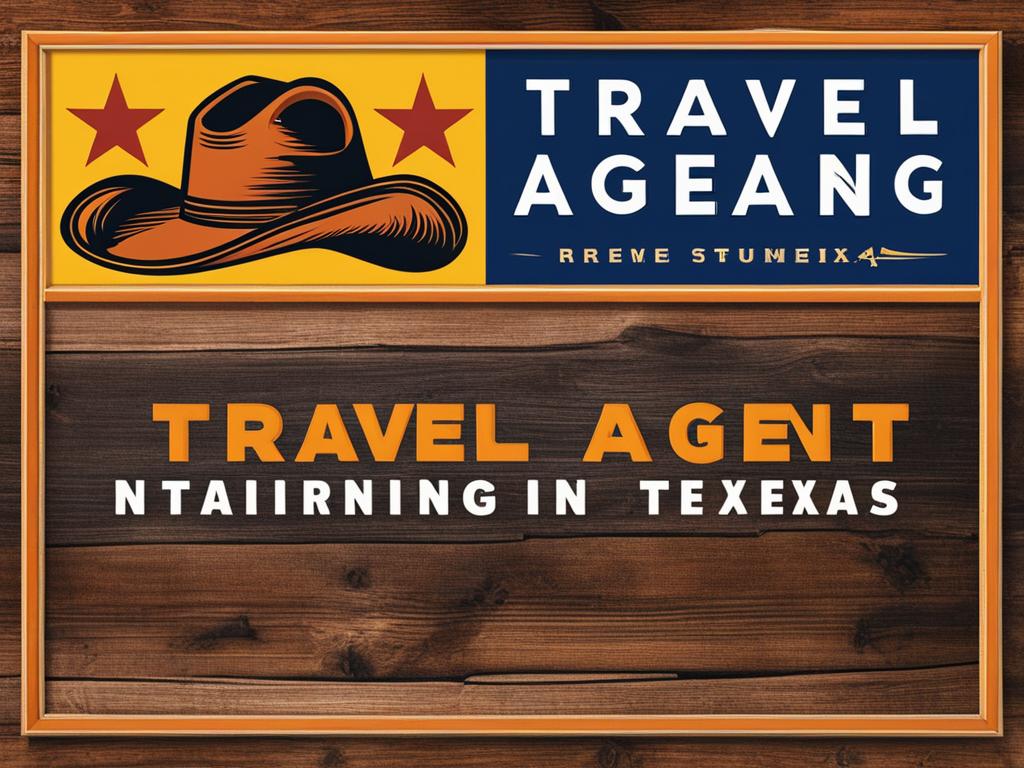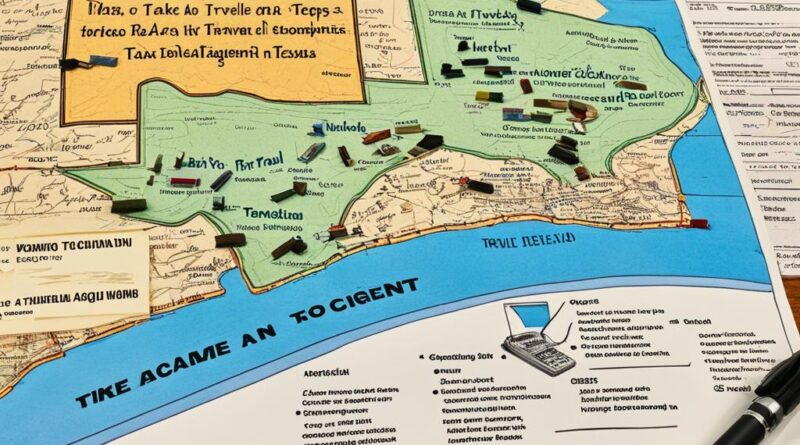Become a Travel Agent in Texas: A Step-by-Step Guide
Are you interested in a fulfilling career that combines your passion for travel and your knack for networking? Becoming a travel agent in Texas may be the perfect opportunity for you. In this guide, we will outline the critical steps to becoming a travel agent in Texas, including joining a host agency, obtaining relevant certifications, and finding your niche in the travel industry.
Key Takeaways
- Understand the role and opportunities for travel agents in Texas
- Join a reputable host agency for support, such as MainStreet Travel
- Undergo comprehensive training to become an effective travel agent
- Obtain relevant certifications, such as Certified Travel Associate (CTA)
- Specialize in a specific travel niche to attract a targeted clientele
- Register your business and understand legal requirements in Texas
- Embrace continuing education and industry trends for long-term success
Understanding the Role and Opportunities for Travel Agents in Texas
Travel agents play a significant role in the ever-growing tourism sector. They are responsible for booking trips and facilitating travel experiences for their clients, who vary in tastes, preferences and budget. In Texas, travel agent requirements provide numerous opportunities for aspiring agents to embark on a successful career within the travel industry.
What Does a Travel Agent Do?
A travel agent’s primary duties involve booking and organizing trips, researching and selecting suppliers, and directly assisting clients with their travel inquiries. Over time, the industry has transitioned from in-person bookings to a greater reliance on online and telephonic interactions, requiring travel agents to adapt and keep pace with changes in technology.
Travel agents have the opportunity to work with an extensive range of suppliers, such as Disney and Universal, which can be achieved by joining host agencies. Host agencies provide travel agents with the necessary tools, resources, and platforms to excel in the industry.
The Growing Travel Industry in Texas
As a popular tourist destination offering diverse attractions, Texas presents a fertile ground for travel agents to thrive. The robust tourism sector has led to an increase in travel agent jobs in Texas.
By capitalizing on local marketing strategies and drawing from personal networks, travel agents can build a growing client base. Host agencies, such as MainStreet Travel, provide comprehensive training and support for agents to succeed in the technologically driven market.
Emphasizing the ever-growing and opportunistic Texas travel industry, the table below highlights some key opportunities available for travel agents:
| Industry Opportunities | Description |
|---|---|
| Affiliate Partnerships | Join established networks and collaborate with travel suppliers to earn commissions on bookings. |
| Host Agencies | Partner with host agencies like MainStreet Travel for training, tools, and support to maximize success in the travel sector. |
| Local Marketing Strategies | Utilize local advertising and social media networks to build a solid client base in Texas. |
| Specialized Niche Services | Offer specialized expertise in specific travel niches to attract clientele with unique travel desires. |
Texas’ growing travel industry presents numerous opportunities for travel agents to forge a successful career. As agents adapt to the ever-evolving landscape of the industry, they must optimize their online presence, establish strong connections with suppliers, and seek ongoing training to meet the demand for personalized, seamless travel experiences.
Choosing the Best Travel Agent Training Program
Entering the travel industry as a seasoned professional requires effective travel agent training in Texas and obtaining the necessary travel agent certification in Texas. Prospective travel agents can leverage comprehensive training programs provided by host agencies, such as MainStreet Travel, which equip them with the necessary knowledge to work with various travel brands and suppliers.
Agents seeking a fruitful career in the travel sector should carefully evaluate training programs that offer essential support for online booking processes and client communication. Developing a strong foundation in these vital areas can significantly impact an agent’s ability to manage bookings and cater to the diverse needs of their clients.
- Training Modules: Ensure that the selected program offers in-depth training modules, covering key aspects of the travel industry like airfare, accommodations, and tour packages.
- Practical Experience: Opt for institutions that provide hands-on, real-life scenarios to hone skills in customer communication and negotiation with vendors.
- Industry Recognition: Choose training programs that offer industry-recognized certifications, which can bolster credibility and reputation among clients and suppliers.
- Continuous Learning: Stay ahead of industry trends by selecting programs that offer ongoing educational resources and mentorship.

Comprehensive training programs provided by host agencies, such as MainStreet Travel, hold the key to unlocking a successful career as a Texas travel agent.
In conclusion, selecting the right travel agent training program is a pivotal step in embarking on a lucrative career as a travel agent in Texas. Aligning with a host agency like MainStreet Travel not only offers comprehensive training and support but also opens up a myriad of opportunities to work with top travel suppliers and brands. Thus, it is critical for aspiring travel agents to invest in a high-quality training program, cementing themselves as dedicated professionals within the industry.
Navigating Travel Agent Certifications and Licensing in Texas
While Texas does not have strict requirements for travel agents, obtaining professional certifications can significantly enhance your credibility and customer trust. In this section, we will discuss the role of certification in the travel industry and essential licenses relevant for travel agents looking to operate in Texas.
The Role of Certification in the Travel Industry
There are several certifications that travel agents can pursue to boost their professional reputation, such as the Certified Travel Associate (CTA) and Certified Travel Counselor (CTC) programs offered by The Travel Institute. By acquiring these certifications, travel agents demonstrate their commitment to the field and assure clients of their industry knowledge.
Additionally, obtaining an International Air Transport Association (IATA) accreditation enables travel agents to tap into a broader range of services within the industry, expanding their scope and clientele.
State Specific Licensing Requirements
Texas does not require state-specific licensing for travel agents to operate within its boundaries. However, it is crucial to familiarize yourself with the nuances and regulations that could apply to your business in the state. Ensuring that you strictly adhere to the Texas-specific regulations helps you function legally and professionally, safeguarding your reputation and credibility as a travel agent.
To summarize, while travel agent licensing in Texas and certifications are not mandatory, having relevant credentials can enhance your standing in the industry. Pursuing professional certifications such as CTA, CTC, and IATA accreditation can provide additional benefits, giving your career a competitive edge and broadening your opportunities within the travel sector.
With this knowledge of the certification and licensing landscape, you will be well-prepared to navigate the path to a successful career as a travel agent in Texas.
Identifying Your Travel Niche
Specialization is a key strategy for travel agents aiming to differentiate themselves in the market. Areas of specialization could include luxury travel, cruises, adventure trips, or destination weddings. Having in-depth knowledge of a particular travel sector not only attracts specific clientele but also builds trust and rapport. Specializing allows agents to offer tailored and expert guidance to those seeking unique travel experiences.

To help you determine which travel niche is the most suitable for your interests and expertise, consider the following popular options:
| Travel Niche | Description |
|---|---|
| Luxury Travel | Focus on upscale and exclusive accommodations, experiences, and services for clients with discerning taste and budget. |
| Cruises | Specialize in booking and coordinating cruise vacations, often including flights, accommodations, and shore excursions. |
| Adventure Trips | Organize thrilling and active experiences for clients, such as hiking, mountain climbing, or whitewater rafting. |
| Destination Weddings | Coordinate all aspects of a wedding in an exotic or unique destination, ensuring a seamless and memorable event. |
To become an expert in your chosen travel niche, it is essential that you:
- Stay updated on the latest trends and developments within the niche.
- Expand your destination-specific knowledge to better serve clients.
- Build and maintain strong relationships with suppliers and other industry professionals.
- Seek out educational opportunities to further develop your expertise.
Remember, the key to success in your travel niche is building trust with your clients and delivering exceptional service that creates memorable experiences.
Understanding Legal and Business Registration in Texas
If you’re wondering how to start a travel agency in Texas, it’s crucial to grasp the legal aspects associated with the endeavor. This includes understanding the requirements for business registration with the state and managing tax obligations. Additionally, it’s essential to comprehend the legal responsibilities of Texas travel agents.
- Business Registration: Prospective travel agents should register their businesses with the Texas Secretary of State’s office as independent contractors to ensure they’re adhering to legal requirements. This includes obtaining an Employer Identification Number (EIN) from the Internal Revenue Service (IRS). To register, you can access the Texas Comptroller’s office website or consult with a local attorney or accountant for assistance.
- Tax Obligations: As a travel agent, you’re required to report and pay federal, state, and local taxes. In Texas, depending on the business structure, you might need to pay franchise tax. Additionally, travel agents must withhold and report federal income tax, social security tax, and Medicare tax from employee wages.
- Travel Regulations: Travel agents must adhere to federal and state travel regulations, ensuring that their business complies with the Federal Trade Commission (FTC) and Texas law. Key areas to keep in mind include full disclosure of fees, refund policies, and accurate representation of travel services.
- Insurance Coverage: Adequate insurance coverage is crucial to protect the interests of your travel agency and shield yourself from potential legal liabilities. Travel agents must consider general liability, errors and omissions, and professional liability insurance policies to safeguard their business.

In conclusion, understanding the legal and business requirements when launching a travel agency in Texas is essential to establishing a successful and legally compliant business. Prioritize business registration, tax obligations, industry regulations, and insurance coverages to ensure you build a solid foundation for your travel agency.
Conclusion
A career as a Texas travel agent offers a fulfilling and rewarding path for individuals who are passionate about travel and eager to provide exceptional experiences for their clients. The journey to establishing yourself as a trusted travel expert in Texas encompasses acquiring the necessary education, securing relevant certifications, and devising a well-thought-out business strategy. Real-life brands like MainStreet Travel serve as an ideal platform for aspiring agents to kickstart their careers with comprehensive support and training.
The ever-changing travel industry demands adaptability and continuous learning in order to stay ahead of trends and new technologies. Pursuing a fulfilling travel agent career in Texas can be marked with challenges, but those who remain enterprising, client-focused, and dedicated to their craft will ultimately thrive in the long run. By specializing in specific travel niches, travel agents can differentiate themselves from competitors and consistently deliver tailor-made, unforgettable experiences for their clients.
In summary, the Texas travel agent landscape is ripe with opportunities for motivated and knowledgeable professionals. By following a clear roadmap that includes proper training, certifications, and a focus on specialization, aspiring agents can build successful and enduring careers in the thriving Texas travel industry.
FAQ
What are the steps to becoming a travel agent in Texas?
The steps to becoming a travel agent in Texas include acquiring necessary education, obtaining travel agent certifications, choosing a training program, identifying your travel niche, registering your business, and adhering to legal and regulatory requirements.
What types of travel agent training programs are available in Texas?
There are various travel agent training programs in Texas, including online courses offered by host agencies like MainStreet Travel, as well as certification programs from reputable institutions such as The Travel Institute.
Is certification required to become a travel agent in Texas?
While certification is not legally required to become a travel agent in Texas, obtaining certifications such as Certified Travel Associate (CTA) or Certified Travel Counselor (CTC) from The Travel Institute can enhance your credibility and open up more opportunities within the industry.
What are the legal requirements for starting a travel agency in Texas?
Legal requirements for starting a travel agency in Texas include registering your business with the state, obtaining a Federal Employer Identification Number (FEIN), and adhering to federal and state travel regulations. Additionally, securing adequate insurance coverage is important for protecting your business.
How can I specialize my travel agency to stand out in the market?
To specialize your travel agency and differentiate yourself in the market, consider focusing on niche areas such as luxury travel, cruises, adventure trips, or destination weddings. In-depth knowledge of a particular travel sector can attract specific clientele and establish trust and rapport with clients.

